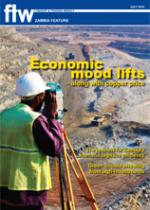Moving freight in and through
Zambia takes a thorough
understanding of the
challenges and support on the ground.
The World Bank’s “Connecting to
compete 2010: Trade logistics in the
global economy logistics performance
index” puts Zambia at 138 out of 155
in terms of overall logistics efficiency.
Germany was ranked number one,
and Somalia last. South Africa is 28th.
In March this year, the Times
of Zambia quoted works and
supply minister Mike Mulongoti
as saying that the country needed
over R1.5-billion a year to
maintain the core road network.
In 1991 it was estimated by the
National Road Fund Agency (NRFA)
that 80% of the road network had
deteriorated.
Road works are funded through a
combination of fuel levy and donor
money, and there are moves to toll
some of the routes.
At 138, Zambia is behind
neighbours Tanzania (95)
Mozambique (136) and Botswana
(134), but ahead of Angola (142).
Malawi and Zimbabwe were not
included due to a lack of data, and
there was insufficient information
for a comparative study on the
Democratic Republic of Congo.
Zambia ranked 111 for customs, 140
for infrastructure, 128 for international
shipments, 149 for logistics quality
and competence, 130 for tracking and
tracing, and 131 for timeliness.
The logistics challenges of
Zambia and its neighbours have a
direct impact on the local economy,
according to the World Bank report.
It states, “except in high-income
countries, the availability and quality
of trade-related infrastructure is a
major constraint to performance”.
According to the World bank
statistics, it costs around US$5 000 and
takes four days to transport a 40-foot
container to Zambia from the nearest
port, which is 2 000 kilometres away.
This made Zambia one of the most
expensive countries in the survey.
According to the study, just 1% of
cargoes entering or leaving Zambia
is physically inspected – which is on
a par with a number of industrialised
and developing countries.
But, through the freight corridors
and other inter-country initiatives,
one of the biggest constraints is
being addressed: “Efficient border
management and coordination of the
various agencies involved in border
clearance is increasingly important,”
says the report.
Zambia has also started removing
some of the red tape and ownership
constraints.
“Income is not the only determinant
of a country’s logistics environment.
Even in low-income countries,
policymakers can do much to boost
performance,” says the report.
Liberalising logistics services
markets, for example, can encourage
local service providers to increase
quality and price competitively. This is
particularly important in sectors such
as trucking and customs brokerage
that are essential to efficient service
delivery by international forwarders,
says the World Bank.
Zambia’s logistics efficiency rates very low on global scale
13 Aug 2010 - by Ed Richardson
0 Comments
Zambia 2010

13 Aug 2010
13 Aug 2010
13 Aug 2010
13 Aug 2010
13 Aug 2010
13 Aug 2010
13 Aug 2010
13 Aug 2010
13 Aug 2010
Border Beat
Featured Jobs
New
